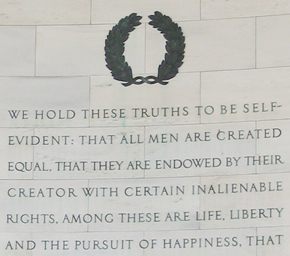Three Ideas Implicit in the American Revolution
July 6, 2008 by Paul McKeever
 The Western Standard (www.westernstandard.ca) asked me to write “a short, 250-word comment on the ideas motivating the American Revolution and the Declaration of Independence. My submission is still online, together with a number of other distinguished individuals’ submissions on the same topic. It all makes for some great food for thought.
The Western Standard (www.westernstandard.ca) asked me to write “a short, 250-word comment on the ideas motivating the American Revolution and the Declaration of Independence. My submission is still online, together with a number of other distinguished individuals’ submissions on the same topic. It all makes for some great food for thought.
What follows is my submission, as headlined and bylined by the fine editors of the Western Standard.
The ideas implicit in the Revolution and the Declaration
Paul McKeever – July 4, 2008
At least three important ideas facilitated the American Revolution and the Declaration of Independence. The first was that man has a rational faculty which he must choose to use if he is to obtain the knowledge upon which his survival depends. The second was that man’s highest purpose in life is to achieve his own happiness. The third was that it is ethically right to pursue one’s own happiness by acting in accordance with the rational conclusions of one’s own mind.
These three ideas were implicit in the actions of those who fought for American independence with the pen or sword. No man lacking a belief that he could rely upon his own mind for his own survival would have sought self-government. No man lacking a belief that the pursuit of his own happiness is his highest purpose in life would have a reason to complain about the misery caused by taxation and tyranny. No man lacking the belief that it is ethically right rationally to pursue one’s own happiness would long have entertained the thought of advocating or fighting for a government that acts only to defend, physically, every individual’s control over his own life, liberty and property. Such a thought would have been devoured by feelings of guilt and shame.
But for the fact that the rational self-esteem of the American revolutionaries has survived among true Americans to this day, there would be no Independence Day today. To those Americans, I bid you fondly a Happy Independence Day.





I suspect you must know about all works Ayn Rand wrote. I remember an essay in Philosophy who needs it, talking about the American sense of life as opposed to the European one, where she states that the american sense of life (mainly self-reliance) was vulnerable because born out of necessity as for the immigrants there was nothing to ‘loot’ and all to construct.
Don’t know too much about Canada frankly, but I follow the US news about every day here in Europe. It seems to me that, even if Atlas is still a bestseller today, things are coming pretty close to what Atlas shows, in the US of today.
Government to me seems to have made it pretty bad looking at the mortgage crisis, real estate tumbling down, car industry going down, inflation and more.
How do you see this? Is it me seeing things too apocalyptic or have they really pushed the limits more than in past decades?
Shall I start learning chinese?
[…] – bookmarked by 4 members originally found by loyda on 2008-12-04 Three Ideas Implicit in the American Revolution https://blog.paulmckeever.ca/2008/07/06/three-ideas-implicit-in-the-american-revolution/ – […]